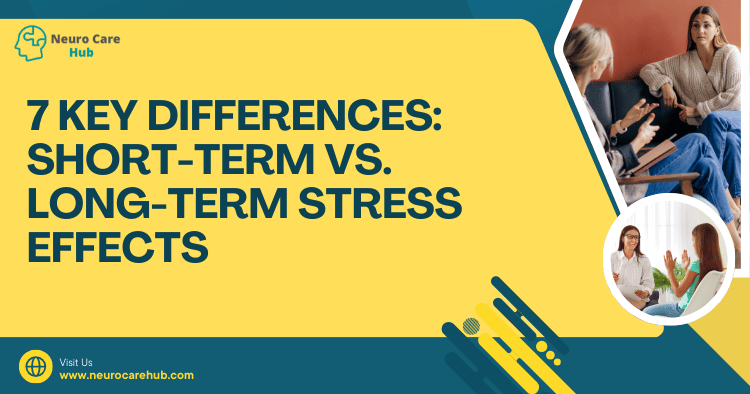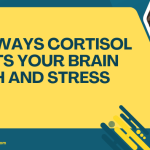Table of Contents
- Introduction
- 1. Duration of Impact
- 2. Brain Structure Changes
- 3. Neurotransmitter Activity
- 4. Cognitive Function
- 5. Emotional Regulation
- 6. Physical Health Connections
- 7. Coping Mechanisms
- Conclusion
- FAQs
Introduction
Stress is an inevitable part of life. Whether it’s a looming deadline at work or the demands of family, our brains are constantly processing stressors. However, the duration and intensity of these stressors can lead to vastly different effects on our brains. In this article, we’ll explore the key differences between short-term and long-term stress effects on the brain, equipping you with knowledge to better manage stress in your life.
1. Duration of Impact
Short-Term Effects:
Short-term stress, also known as acute stress, lasts for a brief period, typically triggered by immediate challenges or threats. During this time, stress can be beneficial, enhancing focus and performance. For instance, a quick presentation at work might trigger a surge of adrenaline, helping you deliver a powerful performance.
“Acute stress can be a catalyst for success, pushing us to achieve our best when it matters most.”
Long-Term Effects:
In contrast, chronic stress persists over extended periods, often due to ongoing pressures like job dissatisfaction or relationship issues. The prolonged nature of chronic stress can lead to significant brain changes and health issues, affecting your overall well-being.
| Type of Stress | Duration | Examples |
|---|---|---|
| Short-Term | Minutes to hours | Job interview, exam |
| Long-Term | Months to years | Ongoing job stress, caregiving |
2. Brain Structure Changes
Short-Term Effects:
Acute stress can temporarily enhance certain brain functions, particularly in the amygdala, which is responsible for processing emotions and responses to threats. This can sharpen your senses and prepare you for immediate challenges.
“Short-term stress can be like a spotlight, intensifying focus and alertness when needed.”
Long-Term Effects:
On the flip side, chronic stress can lead to structural changes in the brain. Studies have shown that prolonged stress can cause atrophy in the hippocampus, which plays a critical role in memory and learning. Additionally, long-term stress may alter the prefrontal cortex, impairing decision-making and impulse control. For detailed insights on brain structure, refer to our article on Top 5 Common Nervous System Disorders Explained.
3. Neurotransmitter Activity
Short-Term Effects:
During short-term stress, neurotransmitters like dopamine and norepinephrine surge, enhancing focus and energy levels. These chemicals help you respond quickly and effectively to immediate threats.
“Think of neurotransmitters as your brain’s emergency response team, ready to spring into action when stress hits.”
Long-Term Effects:
Chronic stress disrupts the balance of neurotransmitters. For example, prolonged exposure to cortisol, the stress hormone, can lead to decreased serotonin levels, which are linked to mood disorders such as depression and anxiety. Understanding neurotransmitter activity is crucial, as highlighted in our article on Top 5 Neurotransmitters: Key Players in the Nervous System.
4. Cognitive Function
Short-Term Effects:
Acute stress can temporarily heighten cognitive functions like memory and attention. This is often referred to as the “fight or flight” response, where your brain gets a boost to react quickly and effectively.
“In moments of acute stress, our brains can become finely tuned machines, optimizing performance when it counts.”
Long-Term Effects:
In contrast, chronic stress can impair cognitive functions. Studies show that long-term stress can lead to difficulties with concentration, memory retrieval, and decision-making. This diminished cognitive capacity can impact daily life, from work performance to personal relationships. To learn more about cognitive health, check out Top 5 Benefits of Regular Neuro Check-Ups for Your Health.
5. Emotional Regulation
Short-Term Effects:
Short bursts of stress can enhance emotional regulation and resilience. The brain’s ability to process emotions is heightened, allowing you to respond to immediate challenges in a more balanced manner.
“Short-term stress can act as a training ground for emotional resilience, helping us tackle challenges head-on.”
Long-Term Effects:
Chronic stress, however, can lead to emotional dysregulation. Over time, the brain’s ability to manage emotions can wear down, leading to increased irritability, anxiety, and mood swings. This can create a vicious cycle, where emotional distress further exacerbates stress. For strategies on emotional well-being, see Top 5 Benefits of Support Groups for Neurological Patients.
6. Physical Health Connections
Short-Term Effects:
While acute stress can be beneficial, it can also trigger temporary physical symptoms, such as increased heart rate and blood pressure. These are generally short-lived and resolve once the stressor is removed.
“Acute stress may induce a fight-or-flight response, preparing the body for immediate action.”
Long-Term Effects:
Chronic stress is linked to numerous physical health problems, including cardiovascular disease, obesity, and autoimmune disorders. The prolonged release of stress hormones can lead to inflammation and other physiological changes that negatively impact health over time. For more about the interplay between stress and health, visit Top 5 Factors Affecting the Cost of Neuro Care.
7. Coping Mechanisms
Short-Term Effects:
In the face of acute stress, individuals often employ effective coping mechanisms, such as problem-solving and seeking social support, which can lead to resilience and growth.
“Effective coping strategies during short-term stress can empower individuals, fostering personal growth and resilience.”
Long-Term Effects:
Chronic stress can erode these coping strategies. People may turn to unhealthy mechanisms like substance abuse, overeating, or withdrawal from social interactions. It’s crucial to recognize these patterns and seek support to develop healthier coping strategies. For effective coping strategies, see our article on Top 5 Strategies for Coping with Chronic Neurological Conditions.
Conclusion
Understanding the key differences between short-term and long-term effects of stress on the brain can empower you to take control of your mental health. While short bursts of stress can enhance focus and performance, chronic stress poses significant risks to cognitive function, emotional regulation, and overall health. Remember, managing stress is not just about avoiding it—it’s about developing effective coping mechanisms and seeking help when needed.
FAQs
Q: What are some effective ways to manage stress?
A: Effective stress management techniques include regular exercise, mindfulness meditation, deep breathing exercises, and maintaining a healthy social support system.
Q: How can I tell if my stress is chronic?
A: If you find yourself feeling stressed most days for weeks or months, experiencing physical symptoms (like headaches or upset stomach), or having trouble sleeping, it may indicate chronic stress.
Q: Is some stress good for me?
A: Yes! Short-term stress can boost performance and alertness. It becomes problematic when it turns into chronic stress.
For additional resources, consider visiting Mental Health America.
By understanding these differences, you can better navigate the complexities of stress and its impact on your brain and body. Stay informed, stay healthy, and remember to take care of yourself!






